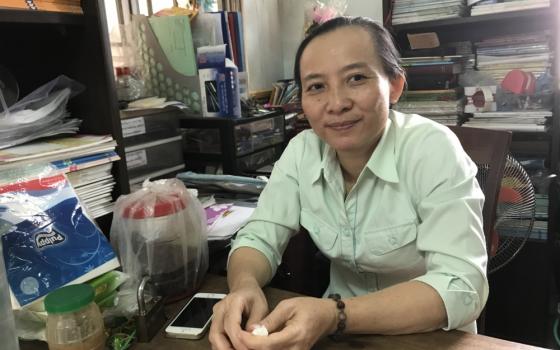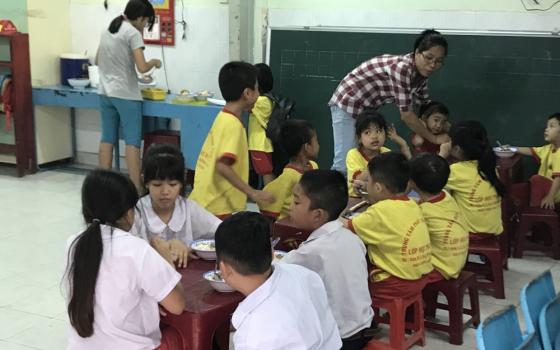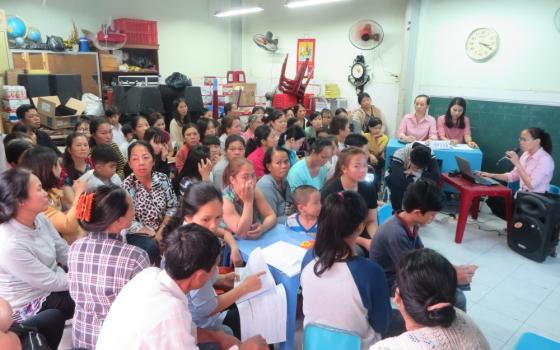In 2001, Phu Cuong Dominican Sr. Mary Cecilia Bui Thi Hong Hanh launched a savings program for domestic migrant women to cover their children's school fees.
Those women are not well educated and scrape out a living by selling lottery tickets and food on the streets and doing manual work in the suburbs of Ho Chi Minh City. They are from various places throughout the country and strangers to one another.
Hanh tried to encourage them to save money out of the monthly scholarships their children were awarded from the Binh Trieu Development Center that she runs. The center for street children was established in 1993 by a Vietnamese-Japanese man and has been headed by Hanh since 2000.
The center, based on the outskirts of the city, offers free elementary education to children in first to fifth grades. Nuns help them obtain birth certificates and other necessary paperwork so they can continue their studies in public schools.
Thanks to the savings plan, hundreds of children from migrant families have graduated from high school and college.
GSR: How did you launch the savings plan?
Hanh: When I started to work at Binh Trieu Development Center in 2000, I saw that parents came to the center every month to receive their children's scholarships without establishing any relationships with one another.
At that time, each student got 150,000 dong ($6.50) a month. The amount was enough for them to pay partly for their basic needs. Their families had migrated from other provinces to look for jobs in the city. They did various work for a living: selling lottery tickets or vegetables on the streets, collecting used items, working at construction sites, doing manual jobs at factories and the like. They lived in poverty and in debt because to pay for unexpected medical treatment and children's school fees, they had to borrow money from money lenders charging a very high rate of interest.
I tried to do something to help them change their lives in a sustainable way from scholarships. I spent time introducing a saving plan and its benefits to women, but they did not understand or support the plan. They said they had no money to save.
I finally gathered 10 women to join a scholarship fund. Thank God for that! Each member monthly took 50,000 dong from their students' 150,000 dong and put it into the fund. Those who needed money presented their conditions to other members, who approved the winner for the month. The fund would end when the final member got the money.
Gradually, they found the meaning of the plan and appreciated its benefits. The savings-credit-interdependent program was established.
How have you developed the program?
In 2001, I launched the savings-credit-interdependent program, in which members sent a monthly saving, as much as they could, to the program. The money would be borrowed by members according to their needs. The rest was put in the bank.
Members borrow money from the program with 1 percent monthly interest. The loan they take out is not more than their total savings to avoid failure to repay. They have to repay their loans monthly until they pay them off.
Now, students get monthly scholarships of 350,000 to 400,000 dong each according to their donors. Their parents save at least 50,000 out of it and put it in the program. There are 60 scholarship recipients ranging from first grade to college.
In their monthly meeting, members who need to take out loans have to show their business plans to others, who offer advice and then decide on approval.
Now we have 55 women in three groups in the program, with shared capital of 200 million dong. We nuns offer them advice and keep the money while members manage the program.
What other benefits do people enjoy?
Through the program, they learn how to save from their own earnings, even though they are poor.
After their children graduate from our center, they have capital to support their children at public secondary schools. The program offers them money to pay for medical treatment and other unexpected expenses so they can avoid borrowing money from money lenders with very high rates of interest.
They are aware of their own interests and have responsibilities of ensuring the interests of other people. The most important thing is that they respect and trust in one another.
They have enough self-confidence to speak their opinions in front of other people and respect each other's views. In the past, they accepted people's ideas in passive ways and did not dare speak their ideas because they were afraid of saying something wrong.
Finally, they share their challenges and problems with one another, visit, console and give gifts to those who have road accidents, diseases, and relatives who have died. They use their monthly interest for their annual tours to other places. They become close friends.
In a society where individualism, consumerism, emotionlessness and suspicion are rampant, it is worthwhile that those poor people show solidarity with one another and trust and support one another to overcome difficulties. At the monthly meetings, they learn moral values, good behaviors and new skills for raising children.
After their children finish studies at the center, they themselves invite other people to join the Spring Credit Program, which has existed for seven years. Now, 26 people are part of this program. They save 50,000 to 100,000 dong a month and send it to the nuns, who put in the bank.
They withdraw the money to cover their expenses during Tet (Lunar New Year) and then restart the program after the holiday.
What does your center do to help children from migrant families?
Now, the center offers free basic education to 340 children from pre-school to fifth grade who are from domestic migrant families. Many parents are illiterate and pay no attention to the education of their children. We ask for benefactors to give them scholarships.
Seven teachers teach 11 classes. One social worker journeys with the children and creates relationships between the center and their families to prevent them from playing truant or dropping out of school.
We also give them books and school uniforms while their families pay 15,000 dong a month for water and utilities. We help them obtain the necessary papers to study at higher public schools after they graduate from the center.
In the past, many children were kept in their own houses or walked around on the streets while their parents were at work because their parents had no money to send them to school.
We also are raising 30 orphans at the center.
We are building a three-story building for the children and the nuns. We hope the new facility will be finished at the end of this year.
We try our best to offer chances to disadvantaged children to study and live a happy life like others.
[Joachim Pham is a correspondent for Global Sisters Report based in Vietnam.]


